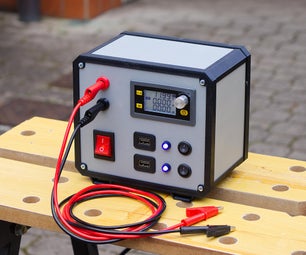Introduction: TPS-based Office Aircon Controller Application
The app allows you to manage traditional air conditioners that are controlled through infrared remotes. Designed for the office environment, the app relies on the ambient brightness (measured by Tibbit #28) to determine whether the aircon should be running or not. In the office setting, no lights = no people = no need for the aircon to work.
Minimum TIDE version:5.02.10
Minimum TiOS version:3.60.00
Platform:TPP2W
Air conditioning is a consumptive business while air conditioners are big-ticket to run. In general, AC systems, older ones, in particular, do not have any real temperature feedback. You set the temperature on your remote, but alas, it has absolutely nothing to do with the actual temperature in the room. Even when it gets colder outsides, many aircons keep blasting cold air into your space. As a result, you have to constantly readjust the temperature as needed for optimal comfort throughout the day.
Of course, air conditioning systems are getting smarter by the day, but the world is still full of older systems that will only retire many years from now. In some cases, this is not even a question of investing in a new system. Sometimes, it is just impossible to rip the old aircon out and put the new one in without undertaking a major interior renovation. Tibbo office in Taipei is stuck in exactly this situation. We just have to make do with the aircon we've got. Oh, and our aircon is controlled with infrared remotes. We have a dozen of them lying around.
A while back, we set a challenge to create a management system for our dated HVAC system. Needless to say, we used our Tibbo Project System (TPS) for this endeavor. Our spec for the aircon controller consisted of two main items:
- The aircon must run or not run depending on whether the lights are on or off. The formula is simple: no lights = no people = no need to run the AC.
- The temperature in the room must be monitored by the device that stops the aircon whenever the temperature is cooled off to the preset point.
We have achieved our goal by using a TPS2L system equipped with these Tibbits:
- IR code processor Tibbit (#26)
- IR front-end Tibbit (#27)
- Ambient light sensor Tibbit (#28)
- Ambient temperature probe
A few words about the probe. This is a new item that will be announced this fall. The probe replaces the ambient temperature meter (Tibbit #29). It is handy to have the meter built right into the TPS. The bottleneck is, the meter is influenced by the internal heat of the TPS system itself. This impact is particularly visible for the TPS2L device - it's LCD really warms up the box! The latest sensor has the same circuit as the Tibbit #29, with the additional advantage of being external to the TPS device. From now on, the measurements are accurate.
Attachments
Step 1: IR Commands
This is where you train your IR code processor to be able to transmit two commands: "On," and "Off." For the "On" command, use the lowest temperature that your aircon's remote allows you to set (usually 16 degrees C). The logic here is that when you need to lower the temperature in the room you can use the coldest temperature setting, and when the room cools down to the preset temperature, the aircon is turned off. So really, you only need two commands.
Step 2: Target Temperature
You don't need to set it here. There are dedicated buttons on the main screen.
Step 3: Pre-cool Start Time
This is something we added along the way. Now it is possible to turn the aircon on, once a day, even before we all arrive at the office. Our day starts at 9 am. We set this time for 8:30 am, and by the time we get in, the office is nice and cool (while the scorching Taipei summer keeps on raging outside). The pre-cool timer is hardcoded for 45 minutes. If the lights are still off at 9:15 the aircon is turned off.
Step 4: Brightness Threshold
This is the brightness that the TPS will consider to correspond to "lights on." The value is not expressed in any standard measurement units; it's just the value the Tibbit #28 returns. So, how do you know what number to set here? Simple: the brightness is displayed on the main screen, like this: "Light level: 718". Note the value with the lights off and on, then set the threshold to some value in the middle between the two.
Step 5: Temp. Meas. Adjustment
This is useful for when you choose to use the Tibbit #29. As we've explained above, its measurements are affected by the internal heat of the TPS itself. You can use a regular thermometer and determine the measurement error. For example, if your thermometer reads 25C, and TPS shows 28C, then you must adjust the temperature by 3 degrees C. The data returned by the new external probe need no adjustment.
Step 6: Further Work
In phase 2 of this project we will connect our aircon controller to an AggreGate server. It will be possible to control the system via a smartphone app, which we going to design for this purpose. Now you know why our configuration menu has items like Network, AggreGate, etc. Stay tuned!














